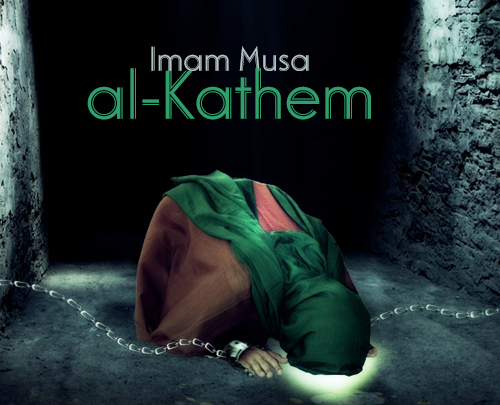An excerpt from Martyr Murtada Mutahari's Book: A Survey into the Lives of the
Infallible Imams (peace be upon them)
Our topic of discussion is about the martyrdom of Imam Musa ibn Ja‘far. Why did
they martyr him? First of all, the fact that Imam Musa ibn Ja‘far was martyred
has been made certain and no one can deny it. According to the most famous and
most valid narrations, Musa ibn Ja‘far spent four years in the corner of prison
dungeons and passed away there. There are historical texts about the time the
Imam spent in prison; suggestions were constantly forwarded to the Imam
demanding for apology or even a verbal confession from him, but the Imam never
agreed.
The Imam in Basrah Prison
The Imam served time not only in one prison, but in several prisons.
They kept on transferring him from one prison to another and this was done,
interestingly, because [in] any prison they took the Imam to, it would not take
long for the prisoners there to become devoted to him. At first the Imam was
taken to Basrah Prison. The Imam was handed over to the governor of Basrah, who
at that time was ‘Isa ibn Ja‘far ibn Abi Ja‘far Mansur, the grandchild of Mansur
Dawaniqi. ‘Isa ibn Ja‘far ibn Abi Ja‘far Mansur was a violent man who did not
take interest in moral issues. As one of his relatives says, “They took this
pious and holy man to a place where he heard things, he never had heard before.”
The Imam was taken to Basrah Prison in the Arabic month of Thul-Hijjah, of the
year 178 AH, which was supposed to be a time of celebration and happiness due to
‘Id al-Adha.
The Imam spent a period of time in Basrah Prison after which even this very ‘Isa
had gradually become fond of the Imam. He too, at first, truly imagined the Imam
to be what the government had broadcasted of him: a rebellious man whose only
skill was ‘to claim to be the rightful successor’. Upon his personal
acquaintance with the Imam, he realized that the Imam was a spiritual man, whose
only purpose of raising the issue of [succession] was to address its spiritual
aspects. The situation then changed. He ordered a very good room to be put at
the Imam’s disposal and entertained the Imam publicly.
Harun sent a secret message, in which he ordered ‘Isa to get rid of him. ‘Isa
responded, “I will not do such a thing.” Finally, ‘Isa wrote a letter to
the Caliph:
“Order them to come and take him back; otherwise, I will set him free myself. I
cannot keep such a man as a prisoner.”
Since he was the Caliph’s cousin and the grandchild of Mansur, his words were,
of course, observed.
The Imam in various prisons
They took the Imam to Baghdad and handed him over to Fadl ibn Rabi‘.
Fadl ibn Rabi‘ was the son of Rabi‘, the chamberlain.
After a while, he also became fond of the Imam, changed the Imam’s conditions
and placed the Imam in a better prison. The spies informed Harun that the Imam
was not having a difficult time in Fadl ibn Rabi‘’s prison. They informed him
that the Imam was not actually a prisoner but actually a guest. Harun took the
Imam away from him and handed him over to Fadl ibn Yahya Barmaki.
After a while, Fadl also started treating the Imam that way which really
frustrated Harun. He sent his spies to investigate. They found out that the
story was true. He finally took the Imam away and Fadl was disfavored by Harun.
In one of Harun’s gatherings, Fadl’s father (an Iranian minister who was hostile
towards the Shi‘as), [in order] to stop his child from being lowered in esteem
by Harun, said in Harun’s ear:
“If my son has done something wrong, I am prepared to follow any orders you may
have. My son has repented, my son this and my son that…”
Afterwards, he came to Baghdad and took the Imam away from his son and handed
him over to someone else called Sindi ibn Shahik who they say was not a Muslim.
The Imam went through a lot of difficulties in his prison; that is to say the
Imam was not left in peace in his prison.
Harun’s request from the Imam
During the last few days of the Imam’s imprisonment, which was not more than one
week before his martyrdom, Harun sent this very Yahya Barmaki to the Imam and
through him, in a nice and soft tone, he told the Imam:
“Send my regards to my cousin and tell him it has been proven to us you have
committed no sin and are blameless. However, I have unfortunately made an oath
and cannot break my word. I have made an oath not to free you before you have
confessed to sinning and asked me for forgiveness. No one needs to know. It is
enough if you confess in the presence of Yahya. I do not need to be there
either; the presence of others is not also needed. I do not want to break my
oath. You only need to confess in Yahya’s presence and say I am sorry that I
have breached and I want the Caliph to forgive me. I will then set you free...”
Now look at his resistive spirit! Why are they referred to as the intercessors
of the transient realm [barzakh]? Why did they become martyrs? They became
martyrs in the way of their true faith and belief. They wanted to show that true
faith does not allow taking steps with the oppressor. The Imam’s response to
Yahya Baramaki was, “Tell Harun that there is not much left of my life and that
is it.” And, after a week, the Imam was poisoned.
The reasons for the Imam’s arrest
Now why did Harun order the Imam’s arrest? Because he was jealous of the Imam’s
position and felt threatened by it even though the Imam was not revolting
against him, nor had he taken the smallest steps to form a revolution (a
discernible revolution). Harun, however, had realized that they had started a
spiritual revolution of beliefs. When Harun decided to consolidate his son Amin
for the position of crown prince, followed by Ma’mun who would subsequently be
followed by his son Mu‘tamid, he invited the scholars and the prominent figures
of all the cities to come to Mecca that year. He organized a massive convention
and took oaths of allegiance from everyone.
Who in his opinion could have been a potential obstacle for this task? Who is
the one in whose presence looks would be directed upon, and would cause others
to think that he would be the one worthy of the position of the caliphate? Musa
ibn Ja‘far.
When Harun came to Medina, he ordered the Imam’s arrest. This very Yahya Barmaki
is reported to have said, “During today or tomorrow, I think the Caliph will
order the arrest of Musa ibn Ja‘far.” They asked him, “How come?” He
replied, “I accompanied him in his pilgrimage [to] the Prophet in Masjid
al-Nabi. When he wanted to say salutation to the Prophet, I saw him say, ‘Peace
is upon you, O son of my uncle! O the Messenger of Allah’!” Then, he said,
“I am very sorry that I have to arrest your son Musa ibn Ja‘far (as if he can
lie to the Prophet) this is what is deemed advisable. If I do not do this, there
will be upheaval in the land. To stop this and, for the interest of this land, I
have to do such a thing. O the Messenger of Allah, I am apologizing.”
Yahya told his friend, “I imagine, today or tomorrow, he is going to order
the Imam’s arrest.”
Harun ordered his men to go after the Imam. It just so happened that the Imam
was not at home. Where was he? He was at the Prophet’s Mosque. The Imam was
praying when they entered. They did not permit him to finish his prayers and
dragged him out of the Prophet’s Mosque. The Imam looked at the Prophet’s grave
and said, “Do you see how your nation is treating your children?”

















